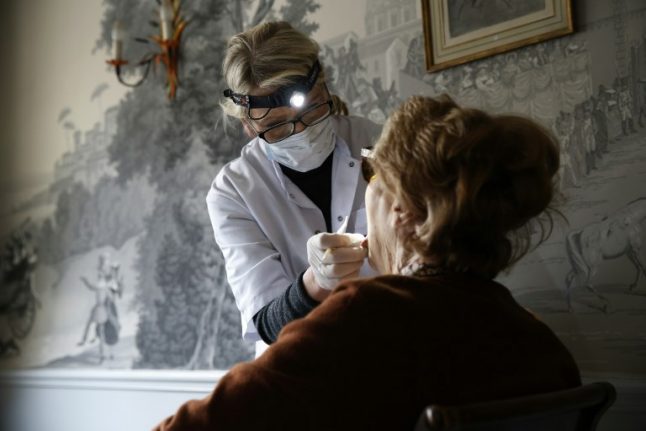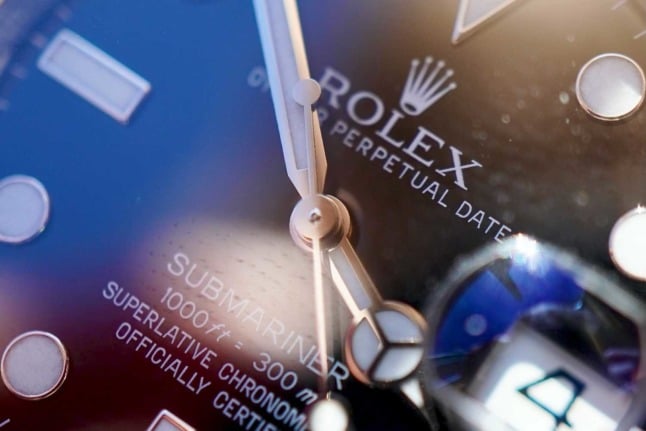Working out what your carte vitale entitles you to within the French health service can be a complicated business.
After taking a look at what you can claim back from the French state with your carte vitale if you have the basic cover afforded by the card, with no top-up insurance, in terms of general healthcare, this time we're focusing on what happens when it comes to dental and eye care.
This is what you need to know.
READ ALSO:
- Carte vitale: What your French health insurance card entitles you to
- How France's health system will change for you in the future
- Healthcare in France: The essential French language you'll need if you're ill
 Photo: AFP
Photo: AFP
Teeth
Dentist appointments
Helpfully dentist appointments are reimbursed in exactly the same way as appointments with GPs, which means you will receive 70 percent back from the French State on the cost of your consultation.
Like doctors, dentists in France work under two sectors – sector one dentists mostly charge the standard €23 apart from in exceptional circumstances, while sector two dentists are entitled to charge more, and you will not get refunds for any amount over the €23 minimum.
That means that in most cases you will receive €16.10 back from the French State for your appointment.
You can check which sector a dentist works under on the official site of France's state health insurance ameli.fr and it will also be listed if you are booking an appointment through the Doctolib app.
Unlike when you visit other specialists you do not need to a referral from your registered GP first to get the 70 percent reimbursement (for more on that read here) and you are free to consult a dentist at any time.
Dental care
The list of reimbursed dental care includes removal of tartar, treatment for decay, as well as tooth removal, among other services, and you will get 70 percent back, with prices for each service varying.
For example if you visit a dentist for tartar removal it will cost €28.92 and, with the basic reimbursement of 70 percent, you will receive €20.24 of that cost back.
Meanwhile for root-canal work on a molar tooth, which is far more expensive at €81.94, you will receive €57.35 back from the French State.
For the full price list of services visit the dental care section of the ameli.fr site.

Photo: AFP
False teeth
The price of certain treatments on false teeth was capped as of April 1st 2019 to make treatment more accessible.
That means that dentists are not allowed to charge more than the maximum price agreed with the French State for 11 types of care, including crown implants (€107.50) and a complete set of dentures (€182.75).
It's important to remember that the government is set to bring in a round of further changes set to make dental care even more accessible over the next couple of years, with certain dental surgery set to be 100 percent covered by basic health insurance.
This will include the cost of metal crowns for back teeth and ceramic crowns for more visible teeth at the front of the mouth as well as certain kinds of bridges and dentures.
While costs will be capped on other kinds of dental surgery, such as the fitting of a ceramic crown at the back of the mouth.
Eyes
Appointments with eye doctors are not reimbursed by the French State, however basic health insurance will cover the some of the costs of your prescription glasses.
The reimbursement system is particularly favourable to those aged under 18.
If you are under 18, frames are reimbursed by 60 percent on the basis of a cost set at €30.49 and lenses are reimbursed at 60 percent of the cost, with prices varying according to the kind of prescription you need.
For example the cost of single focus clear lenses you will be reimbursed 60 percent of €12.04 – even if they cost more, while for the most serious prescriptions you will be reimbursed 60 percent of €66.62, and again that's even if they end up costing you more.

Photo: AFP
Meanwhile, if you are over 18, you'll also be refunded 60 percent of the price of your frames – but the catch is that this is based on a cost set at €2.84.
Similarly the price you'll be refunded for on your lenses is also much lower.
For the lowest prescriptions you will 60 percent of €2.29 back and for the most serious prescriptions, you will receive 60 percent of €24.54 back.
For the full list of reimbursements on eye care, check the ameli.fr site here.
However there is some good news for anyone who can hold off on getting their specs for another year.
From 2020, the price of glasses will be fully covered for “quality lenses” and for frames costing up to €30.
Opticians will stock 17 adult frames and seven children's models, all available in multiple colors and wearers will be able to renew them every two years and once a year for under-15s.
On the other hand, customers who want branded frames or a special treatment on the lenses may have to cover part of the cost themselves, depending on the benefits of their top-up health insurance known as a “mutuelle”.




 Please whitelist us to continue reading.
Please whitelist us to continue reading.
Member comments